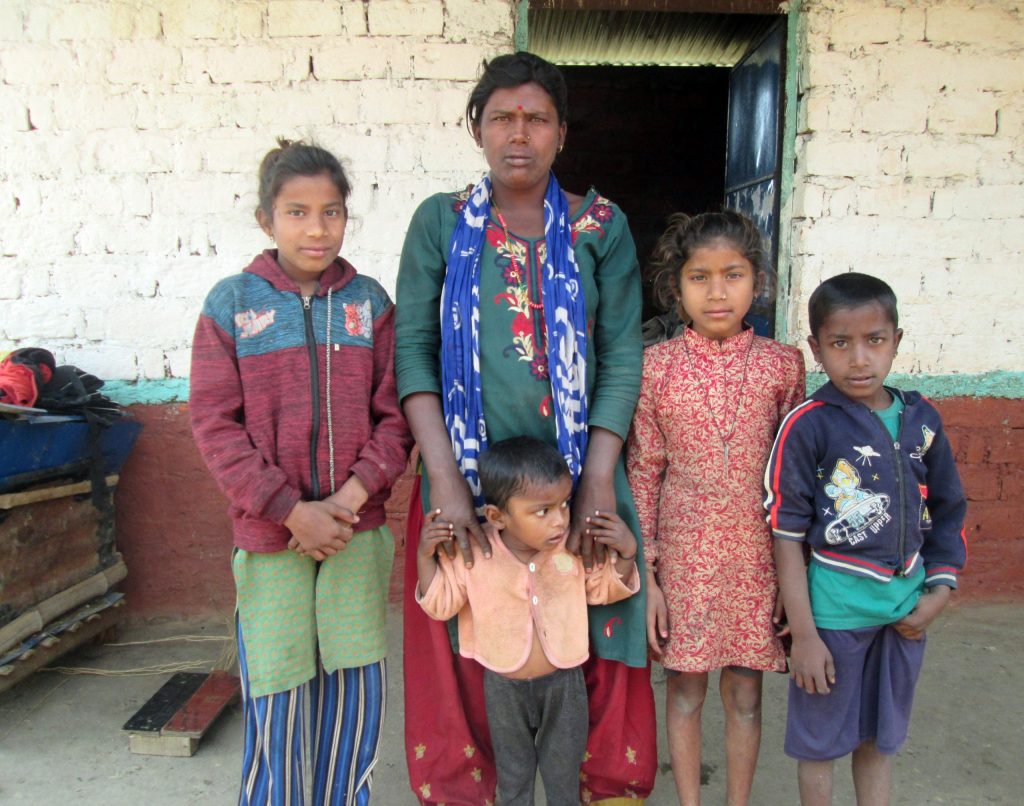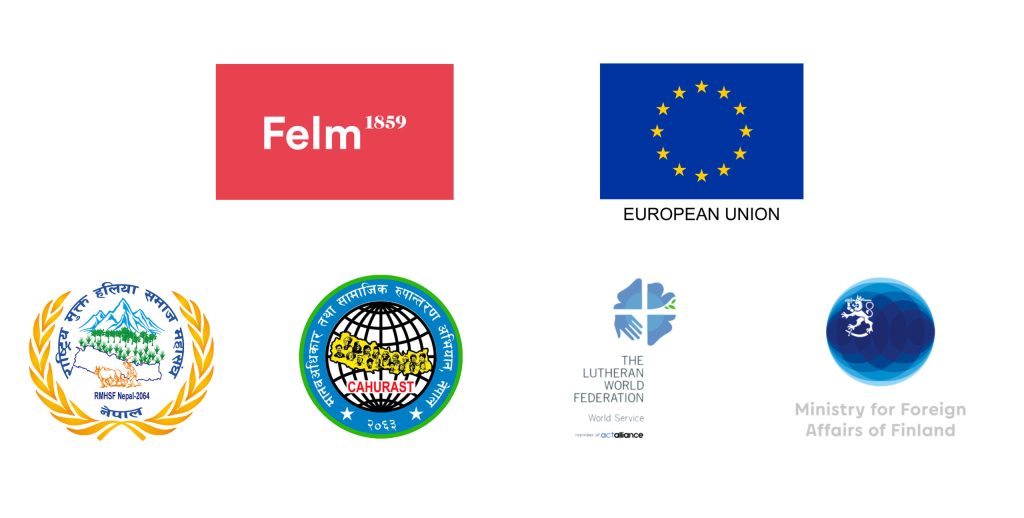Janaki Lawad, 31, is one of the former Haliyas who until 2008 were bonded laborers in Far-Western Nepal, enslaved by their landlords to till the earth and do other hard labor, with little or no compensation.

(Below in Nepali)
Janaki Lawad, 31, of Bhimdatta Municipality in Kanchanpur district has been living in an Integrated Freed Haliya Settlement. She is one of the former Haliyas who until 2008 were bonded laborers who were enslaved by their landlords to till the earth and do other hard labor with little or no compensation. She has a family of six, including two sons and two daughters. She doesn’t own a house or land. And yet she hasn’t given up hope of owning her own house with the government’s help.
She is currently taking temporary shelter at another freed Haliya’s house. Janaki Lawad says, “Because I don’t have a house and a piece of land, I’m compelled to take shelter in someone else’s house. I’d like to appeal to the government to help me build a house, help arrange employment for us, and help ensure education and healthcare to my children as soon as possible.”
She and her husband have been working hard to earn daily wages so that they can support their family. If they don’t earn wages, they have to go to bed hungry. Her husband says the COVID-19 pandemic has affected their work too. Their children, too, have suffered, as the pandemic has affected education sector. Because Bagphanta area doesn’t have a school, their kids need to travel farther for education.
Many freed Haliyas still unregistered
She says that her family moved to Kanchanpur 22 years ago after she had difficulty in earning a living while working at the house of a landlord in Baitadi. Even after moving to Kanchanpur, she had to work for another landlord, where she spent seven years as there was no alternative for livelihood. While working there, the government of Nepal abolished Haliya system in 2008, and that is when her family was liberated from Haliya system.
Abolition of Haliya system followed after a continuous campaign by the Haliya Federation, an umbrella organization of Haliyas of western Nepal, and several other human rights groups, which culminated in a five-point agreement between the government of Nepal and the Federation. After the declaration of Haliyas’ release, the government completed the task of collecting data of 19,059 Haliya families in 12 districts of the Sudurpaschim and Karnali provinces. When the data was re-verified, 16,953 Haliya families were identified.
During the process, many Haliyas including Janaki Lawad were left out in the government’s official registration system. In Janaki Lawad’s case, when the data was being collected, she had fallen seriously ill and had traveled across the border to India with her family for treatment. She was freed only after returning to Nepal from India, but by then the data collection work had ended.
According to government statistics, so far 14,242 freed Haliyas have received identity cards. But their rehabilitation started much later – only in 2013, five years after they were officially liberated. As of now, 13,546 households have been rehabilitated. Another 3,407 (20%) freed Haliya families are still waiting for the rehabilitation package.
In Sudurpaschim and Karnali, 15,000 freed Haliyas have been left out of the official government list of freed Haliayas, according to the Haliya Federation. When the Haliayas were liberated in 2008, the local bodies were without people’s representatives; many freed Haliyas did not get timely information; many freed Haliyas had traveled to India for employment; and the names were omitted due to the negligence of the local bodies.
Hope for the future
Currently, the Haliya Federation, in coordination with the Ministry of Land Management, Agriculture and Cooperatives of the Sudurpaschim Province Government, has stepped up the task of compiling records of freed Haliyas whose names are missing in government statistics. Central President of Haliya Federation Mr. Ishwor Sunar says that Janaki Lawad, too, has been included in the updated statistics.
Now Janaki Lawad is more optimistic about her future because Freed Haliya Empowerment Project is being launched in Bhimdatta Municipality, Kanchanpur, to help freed but yet-unregistered Haliyas like her.
“I am very happy to know that the concerned project is coming to our village. I’m sure this project would help our family and many others who don’t yet have an ID card.”
She hopes the project will address key issues like identification, verification, rehabilitation, social empowerment, social inclusion, employment, education of children, health and ending discrimination against women in her community.
Written by: Hari Singh Bohara (RMHSF-N)
This blog has been produced with the financial assistance of the European Union. The contents of this text are the sole responsibility of the project partners and can in no way be taken to reflect the views of European Union.
१३ वर्ष पछि अन्ततः जानकी लावड, ३१, मुक्त हलियाको सूचीमा पर्दै
३१ वर्षीया जानकी लावड कञ्चनपुर जिल्लाको भिमदत्त नगरपालिकास्थित एकीकृत सामूहिक मुक्त हलिया बस्तीमा बस्दै आएकी छिन् । उनको परिवारमा २ छोरा, २ छोरी, श्रीमान् र उनीसहित जम्मा ६ जनाको परिवार रहेको छ । उनको आफ्नो घर र जग्गा केहि छैन । उनि अहिले एकीकृत सामूहिक हलिया बस्तीमा अर्काको घरमा अस्थायी रुपमा शरण लिएर बसिरहेकी छिन् । ६ जना परिवारका सदस्यहरुको दैनिक जीवन चलाउन उनीलाई कठिनाई भईरहेको छ । दुवै जना पति–पत्नीले दिनभरि ज्याला मजदुरी गरि परिवारको पालन–पोषन गरिरहेका छन् । काम नपाएको दिन भोकै बस्नु पर्ने बाध्यता रहेको छ । कोरोना महामारीका कारण नियमित काम समेत नपाउने गरेको उनका श्रीमान् बताउछन् । छोराछोरीलाई पढाउन नजिक स्कुल छैन, टाढा जानुपर्ने बाध्यता रहेको छ ।
बैतडी जिल्लाको दोगडा केदार गाँउपालिका रहेको एक साहूको घरमा हलिया श्रम गर्दै गर्दा जीविकोपार्जनमा समस्या आएपछि २२ बर्ष अघि उनको परिवार कञ्चनपुर बसाई सरेको उनी बताउछिन् । जीविकोपार्जनको कुनै विकल्प नभए पछि कञ्चनपुरमा अर्कोे घरमा ७ बर्ष देखि हलिया श्रम गरिरहेकै अवस्थामा सन् २००८ मा नेपाल सरकारले हलिया मुक्तिको घोषणा गरेपछि आफ्नो परिवार पनि हलिया प्रथाबाट मुक्त भएको उनले बताईन् ।
हलिया महासंघका साथै अन्य मानव अधिकार रक्षक संस्थाहरुको निरन्तरको अभियान र आन्दोलनबाट नेपाल सरकार र हलिया महासंघ बिच ५ बुदें सहमति भयो । सोही सहमति बमोजिम सन् २००८ मा नेपाल सरकारले हलिया मुक्तिको घोषणा गर्यो । हलिया मुक्तिको घोषणा पछि नेपाल सरकारले सुदर–पश्चिम र कर्णाली प्रदेशका १२ जिल्लामा रहेका १९,०५९ हलिया परिवारको तथ्यांक संकलन गर्ने कार्य सम्पन्न ग¥यो । उक्त तथ्यांक लाई पुनः प्रमाणिकरण गर्दा १६,९५३ तथ्यांक सार्वजनिक गरिएको थियो । तथ्यांक संकलनका क्रममा जानकी लावड सिकिस्त बिमारी भई परिवार सहित छिमेकी मुलुक भारतमा उपचार गर्न गएकी थिईन् । भारतबाट उपचार गरी नेपाल फर्केपछि तथ्यांक संकलनको कार्य सम्पन्न भई सकेकोले आफू छुटेको उनले बताईन् ।
नेपाल सरकारको हाल सम्मको तथ्यांक हेर्दा १४,२४२ जना मुक्त हलियाहरुले परिचय पत्र प्राप्त गरेका छन् । ९ बर्ष अघि सन् २०१३ देखि मुक्त हलिया पुर्नस्थापनाको कार्यक्रम शुरु भएको थियो, हाल सम्म १३,५४६ घरधुरीको पुर्नस्थापन कार्य सम्पन्न भएको छ । अझै ३,४०७ घरधुरी मुक्त हलियाहरु पुर्नस्थापनको पर्खाईमा रहेका छन् । सुदूर–पश्चिम र कर्णाली प्रदेशका जिल्लाहरुमा १५,००० हजार मुक्त हलियाहरु सरकारी सूचीमा नाम छुट्न गएका छन् । उक्त रेकर्ड हलिया महासंघसँग रहेको छ । तत्कालीन समयमा स्थानिय निकायहरु जनप्रतिनिधि विहीन रहेको, धेरै मुक्त हलियाहरुले समयमा सुचना नपाएको, धेरै मुक्त हलियाहरु भारतमा रोजगारी गर्न गएका र स्थानिय निकायहरुको लापरवाहीका कारण तथ्यांकमा नाम छुटेको थियो ।
हाल हलिया महासंघले सुदूर–पश्चिम प्रदेश सरकारको भूमिव्यवस्था, कृषि तथा सहकारी मन्त्रालयसँग समन्वय गरी सरकारी तथ्यांकमा नाम छुटेका मुक्त हलियाहरुको रेकर्ड संकलन गर्ने कार्य अघि बढाएको छ । उक्त तथ्यांकमा जानकी लावड समेत समेटिएको हलिया महासंघका केन्द्रीय अध्यक्ष ईश्वर सुनारले बताए ।
जानकी लावड भन्छिन्, “मेरो घर, जग्गा केहि छैन, अर्काको घरमा शरण लिएर बसेकी छु । सरकारले छिट्टै मेरो घर निर्माण, रोजगारीको व्यवस्था र छोराछोरीको शिक्षा, स्वास्थ्यको प्रबन्ध गर्न अनुरोध गरेकी छिन् ।”
अन्तमा जानकी भन्छिन्, “म बस्दै आएको भिमदत्त नगरपालिका कञ्चनपुरमा मुक्त हलिया सशक्तिकरण परियोजनाको सुरुवात भईरहेको जानकारी पाउँदा धेरै खुशी भएकी छु ।” मुक्त हलिया महिलाहरुको पहिचान, प्रमाणिकरण, पुर्नस्थापन, सामाजिक सशक्तिकरण, समावेशीकरण, रोजगारी, बाल–बालिकाहरुको शिक्षा, स्वास्थ्य र महिलामाथि हुने विभेदको अन्त्य लगायतका मुल मुद्धाहरु सम्बोधनमा यस परियोजनाबाट थप सहयोग पुग्ने उनको आशा रहेको छ ।
लेखक हरि सिंह बोहरा हुन् । (हलिया महासंघ)
यो ब्लग बनाउन युरोपियन युनियनले आर्थिक सहायता गरेको छ । यस लिखित सामग्रीमा समावेश धारणा/ पूर्ण रुपमा परियोजना साद्मेदारका हुन् र युरोपियन युनियनले यसको जिम्मेवारी लिदैन ।
